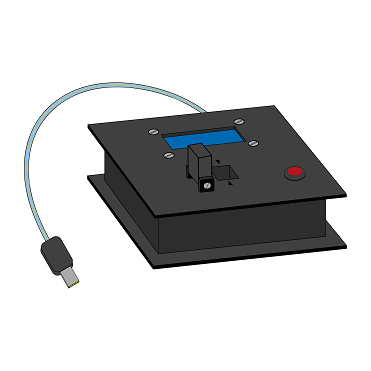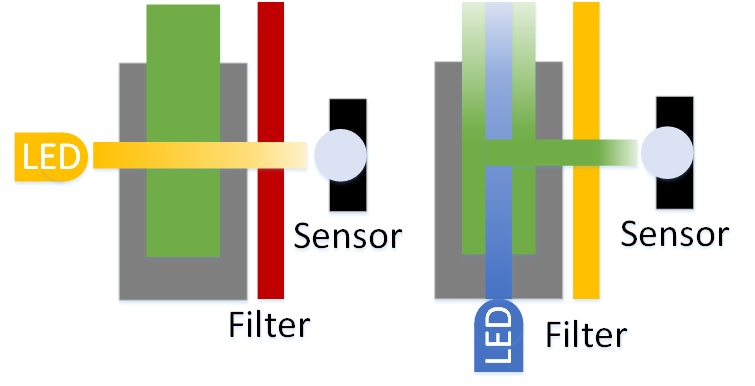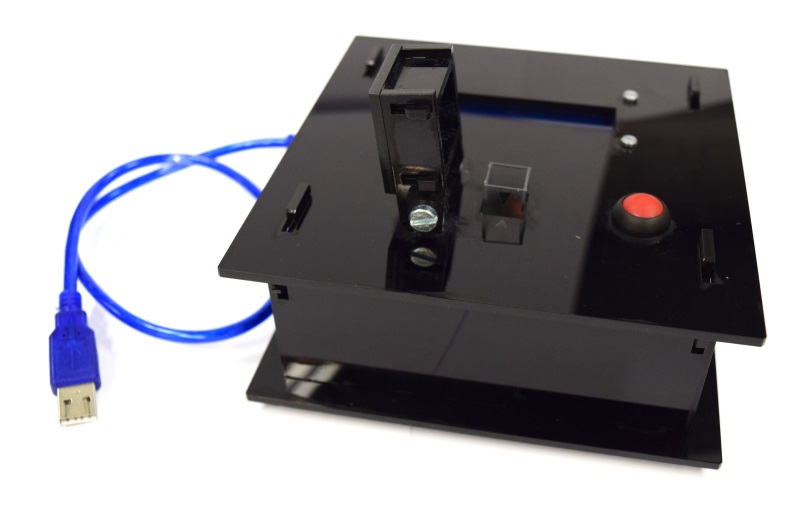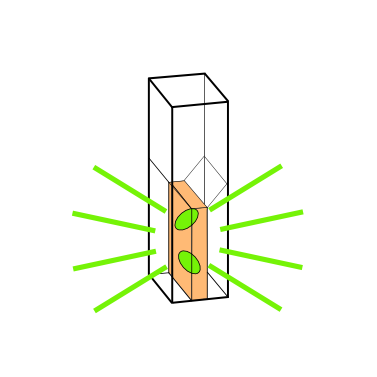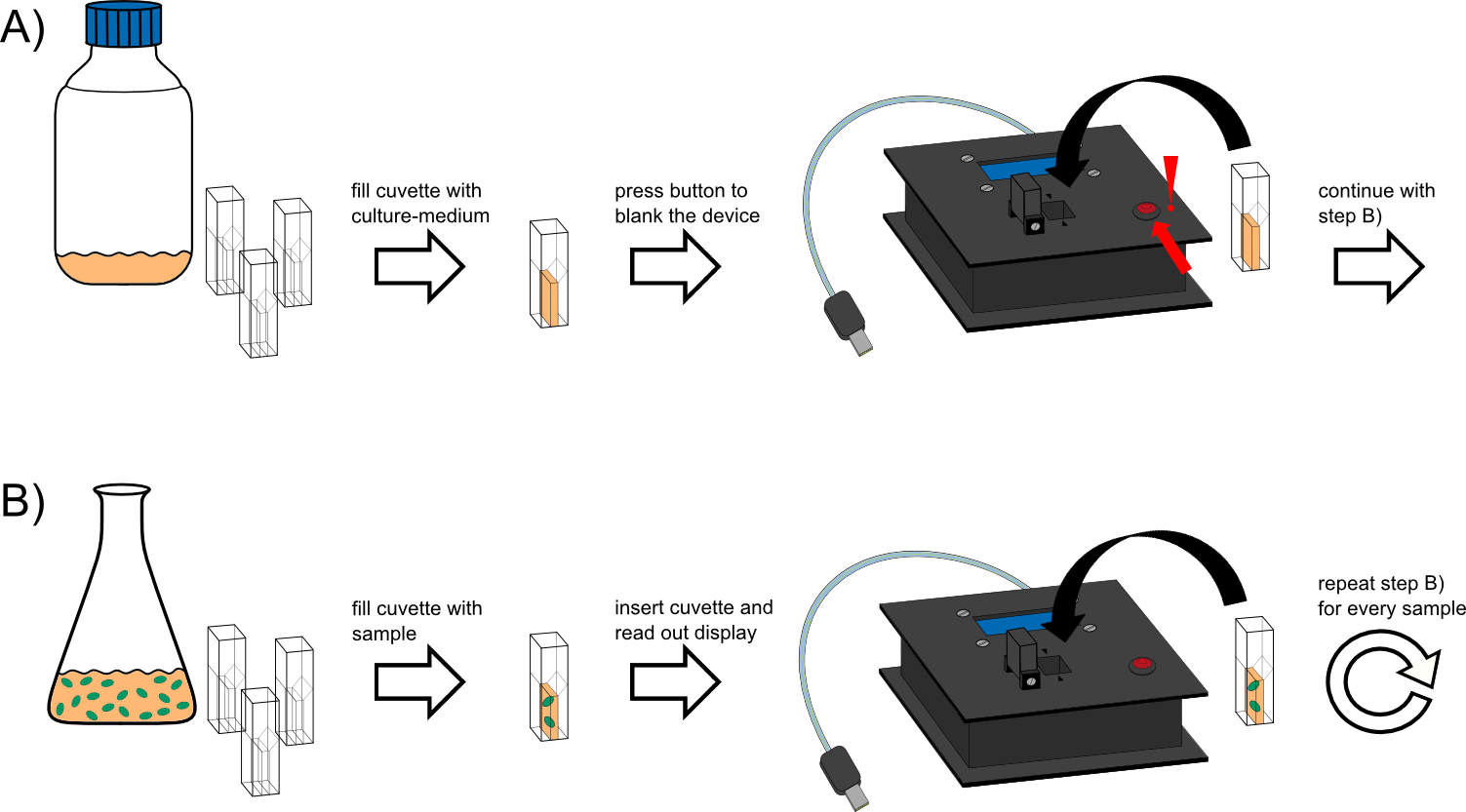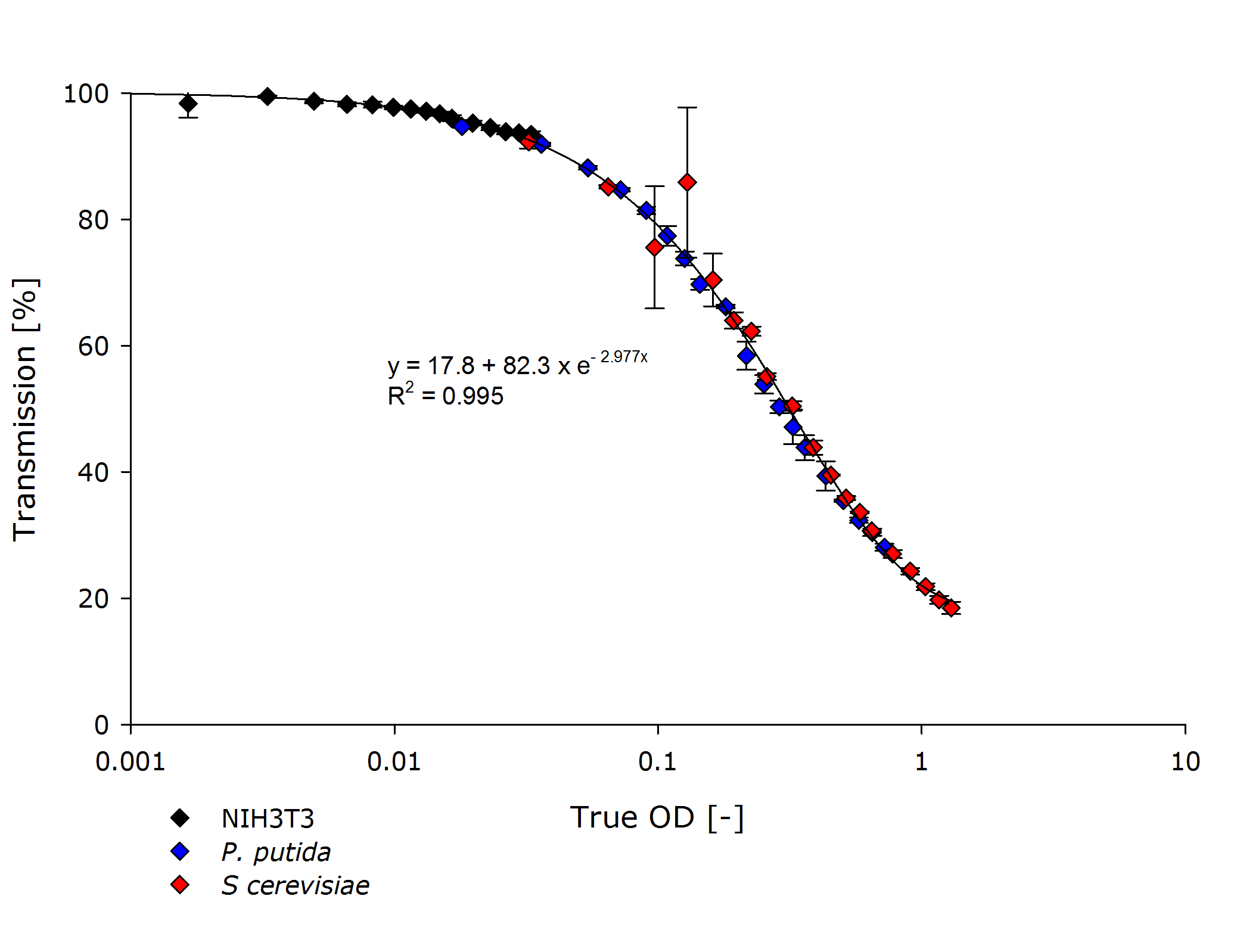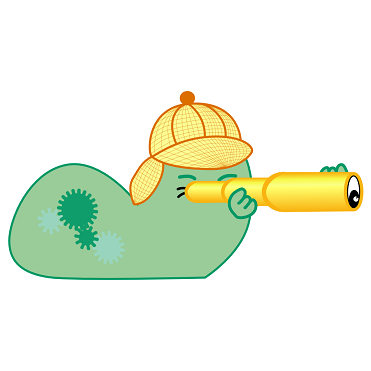|
|
| (109 intermediate revisions not shown) |
| Line 1: |
Line 1: |
| | __NOTOC__ | | __NOTOC__ |
| | + | {{CSS/Main}} |
| | + | {{Team:Aachen/Stylesheet}} |
| | {{Team:Aachen/Header}} | | {{Team:Aachen/Header}} |
| | | | |
| - | = OD/F device = | + | = OD/F Device = |
| | | | |
| - | Measuring Optical Density (OD) is a '''central element in microbiological work and synthetic biology'''. One question that has to be answered often is how many cells are in a suspension. Here, the OD can give you a hint. Unfortunately, commercially available OD meters '''cost several hundred dollars''' ([http://www.laboratory-equipment.com/laboratory-equipment/cell-density-meter.php OD meter]), and can '''limit''' the spread of synthetic biology. | + | Measuring '''Optical Density''' (OD) or absorbance is one of the indispensable elements in the field of microbiology. One question that has to be answered often is '''how many cells are in a suspension'''? Here, the OD can give a hint. However, the commercially available [http://www.laboratory-equipment.com/laboratory-equipment/cell-density-meter.php OD meters] are expensive and limit its application and usage in low budget institutions. |
| | | | |
| - | Therefore, we wanted to devenlop an alternative for measuring OD, '''specifically designed for BioHack-Spaces, DIY and community laboratories and schools'''. With our OD/F device, we want to enable many people to do good, precise and inexpensive science research. | + | Therefore, here we present our OD/F Device. The device is specifically designed for biohackspaces, Do It Yourself (DIY), community laboratories and schools. With our OD/F Device, we aim to enable precise and inexpensive scientific research. |
| | | | |
| - | Especially for the [[Interlab Study]] fluorescence, too, has been of importance. One aim of this study was to measure the correlation between OD and fluorescence. Since the taks of measuring OD and fluorescence are often performed at the same time, we want to present a device that can '''measure both fluorescence and OD''' with just some easy adjustments. This way, we can measure how much fluorescence there is per amount of cells.
| + | Further, in Synthetic Biology, the task of measuring OD and fluorescence are often performed at the same time. Hence, here we present a device that can be configured to '''simultaneously measure both fluorescence and OD'''. With such a configuration of the OD/F Device, the production of fluorescence signal can be correlated to cell growth using a single and a portable device. |
| | | | |
| - | In fact, you can find some DIY posts for turbidity meters such as [http://www.thingiverse.com/thing:74415 turbidity sensors]. However, a proper assessment of their linearity as well as a calculated OD-value are missing.
| + | <html> |
| - |
| + | <center> |
| - | Regarding fluorescence, we are of course not re-inventing the wheel (well, not totally). The [https://2010.igem.org/Team:Cambridge 2010 iGEM Cambridge] team actually built a very similar device, the [https://2010.igem.org/Team:Cambridge/Tools/Eglometer E.glometer]. However, there's no data available showing an actual comparison of the data from their device and some proven commercial system to, for example, to assess linearity of the measurement.
| + | <ul class="menusmall-grid"> |
| | + | <!-- Overview --> |
| | | | |
| - | {{Team:Aachen/BlockSeparator}}
| + | <li> |
| | + | <a class="menulink" href="https://2014.igem.org/Team:Aachen/OD/F_device#odfmeasuringprinciple" style="color:black"> |
| | + | <div class="menusmall-item menusmall-info" ><div class="menukachel" style="top:25%; line-height:1.5em;">Measuring Principle</div></div> |
| | + | <div class="menusmall-item menusmall-img" style="background: url(https://static.igem.org/mediawiki/2014/0/0f/Aachen_14-10-10_ODF_Button_ipo.png); norepeat scroll 0% 0% transparent; background-size:100%"> |
| | + | </div> |
| | + | </a> |
| | + | </li> |
| | | | |
| - | == Development == | + | <li> |
| | + | <a class="menulink" href="https://2014.igem.org/Team:Aachen/OD/F_device#odfapplication" style="color:black"> |
| | + | <div class="menusmall-item menusmall-info" ><div class="menukachel" style="top:35%; line-height:1.5em;">Application</div></div> |
| | + | <div class="menusmall-item menusmall-img" style="background: url(https://static.igem.org/mediawiki/2014/5/55/Aachen_17-10-14_Glowing_cuvette-ipo.png); norepeat scroll 0% 0% transparent; background-size:100%"> |
| | + | </div> |
| | + | </a> |
| | + | </li> |
| | | | |
| - | Building the OD/F device has been an interesting task. On the one hand, this device has been developed mainly by the IT division of our team. On the other hand, we got assistance from the biologists suffering from color-blindness, yet eager to help selecting the best color filters for the LEDs. For the next year, you really have to select carefully who's going to help with which task!
| + | <li> |
| | + | <a class="menulink" href="https://2014.igem.org/Team:Aachen/OD/F_device#odfachievements" style="color:black"> |
| | + | <div class="menusmall-item menusmall-info" ><div class="menukachel" style="top:25%; line-height:1.5em;">Achieve-<br/>ments</div></div> |
| | + | <div class="menusmall-item menusmall-img" style="background: url(https://static.igem.org/mediawiki/2014/e/ef/Aachen_14-10-15_Medal_Cellocks_iNB.png); norepeat scroll 0% 0% transparent; background-size:100%"> |
| | + | </div> |
| | + | </a> |
| | + | </li> |
| | | | |
| - | The essential part of this device is the cuvette holder which has also been the most tricky thing to develop. In short, we had to overcome a dilemma created by the need for an optimal height for the sensor:
| + | <li> |
| - | * A too low sensor position bears problems with sedimentation as well as diffraction from the bottom of the cuvette
| + | <a class="menulink" href="https://2014.igem.org/Team:Aachen/OD/F_device#odfoutlook" style="color:black"> |
| - | * The sensor has to be as close as possible to the bottom so that enough light shines through for the fluorescence measurement.
| + | <div class="menusmall-item menusmall-info" ><div class="menukachel" style="top:35%; line-height:1.5em;">Outlook</div></div> |
| | + | <div class="menusmall-item menusmall-img" style="background: url(https://static.igem.org/mediawiki/2014/6/67/Aachen_14-10-16_Outlook_Cellocks_iNB.png); norepeat scroll 0% 0% transparent; background-size:100%"> |
| | + | </div> |
| | + | </a> |
| | + | </li> |
| | | | |
| - | As a compromise, we place the sensor in 0.75 cm height, which, as it turned out later, is very close to one of the standard heights (0.2 cm, 0.8 cm, 1.2 cm) of OD meters. It is important to note that despite the minimal fill height of 1.2 mL of the 1.5 mL cuvettes we used, our device also works with filling volumens of just 1 ml, which in fact comes closer to reality in the lab.
| + | </ul> |
| - | | + | |
| - | The final cuvette holder design was rendered in a stl-file shown below:
| + | |
| - | | + | |
| - | <html>
| + | |
| - | <center>
| + | |
| - | <iframe src="https://2014.igem.org/Team:Aachen/Notebook/Engineering/Cuvette3D?action=render
| + | |
| - | " width=500px height=500px frameBorder="0"></iframe>
| + | |
| | </center> | | </center> |
| | </html> | | </html> |
| | | | |
| - | Once the cuvette holder was finished, '''finding good filters was a tough challenge'''. The overall goal has been to choose easily available parts which are also inexpensive. So choosing Schott glasses as filters unfortunately could not be considered. Instead, filters used for illumination of theaters seemed to be ideal solution.
| |
| - |
| |
| - | Especially for the fluorescence measurements of GFP this has been a big problem. [http://parts.igem.org/Part:BBa_E0040 GFPmut3b] has a peak excitation at 501 nm and a peak emission at 511 nm - too close together for our low-cost filters to block the excitation light but transmit the emitted light. Thus, we chose to excite at around 485 nm reduce false positive results below 500 nm. However, no adequate filter for these settings could be found.
| |
| - | Eventually, using the dark greenish Twickenham Green filter only little amounts of light shorter than 500 nm got through, reducing any bias from excitation illumination significantly. Unfortunately, the transmission rate of this filter is quite bad, 20 % only, for the target emission wavelength of 511 nm.
| |
| - |
| |
| - | For the OD measurement, too, we had similar problems. The solution to this problem is presented in the F device section.
| |
| - |
| |
| - | <html>
| |
| - | <sup><span class="anchor" id="fn1"></span>1. Quite a good random number generator from a computer-scientific perspective!<a href="#ref1" title="">↩</a></sup>
| |
| - | </html>
| |
| - |
| |
| - | <center>
| |
| - | {{Team:Aachen/FigureFlex|Aachen_odf_schemes.png|title=Interlab Study Results|subtitle=Our measurements of fluorescence and optical density of the three genetic devices and a negative control.|width=400px}}
| |
| - | </center>
| |
| - |
| |
| - | == Combined Device ==
| |
| - |
| |
| - | Even though evaluation of the measurements have been performed in two separate device, it is fairly well possible to put everything into one casing.
| |
| - | All you need to do is choosing another lid, and connect a second light to frequency sensor to your Arduino.
| |
| - | Right at the bottom we present you the differences in wiring things up.
| |
| | | | |
| | {{Team:Aachen/BlockSeparator}} | | {{Team:Aachen/BlockSeparator}} |
| | | | |
| - | = Measurement Setup =
| + | [[File:Aachen_14-10-10_ODF_Button_ipo.png|right|150px]] |
| | | | |
| - | As for any scientifc device it is crucial to question the results one gets from the device. To ensure that our device actually works, we performed a set of measurements which are presented below.
| + | == Measuring Principle == |
| | + | <span class="anchor" id="odfmeasuringprinciple"></span> |
| | | | |
| - | == Linearity ==
| + | The measuring principle for both optical density (OD) and fluorescence measurement is shown below. For OD measurement, the sample is illuminated with an LED and a fixed slit width. A filter blocks any light less than 600 nm. In this way, the sensor mainly senses the 600 nm light which is needed for OD{{sub|600}} measurement. |
| | | | |
| - | It is crucial that the selected hardware is mapping reality into the digital world of our $\mu$-Controller.
| + | For the fluorescence measurement, a similar approach is followed. The filter, again, is used to block the exciting light from being sensed. In this way, only the emitted light from the fluorescence protein is detected and measured. |
| - | In order to sense reality our setup uses a light to frequency sensor, [https://www.sparkfun.com/datasheets/Sensors/Imaging/TSL235R-LF.pdf TSL235R-LF]. | + | |
| - | The light to frequency sensor resembles the most to a photo transistor and thus is less sensible to temperature than a light dependant resistor.
| + | |
| - | Additionally counting a frequency using interrupts seems to be easier and more accurate than using the analog to digital converter.
| + | |
| | | | |
| - | Using a dilution series of purified [ iLOV] we could determine the characteristic curve for the light sensor. Finally we can conclude that the sensor is linear as expected and shown in the [https://www.sparkfun.com/datasheets/Sensors/Imaging/TSL235R-LF.pdf datasheet].
| + | Further details about selecting filters, code, a construction manual and evaluation can be found [https://2014.igem.org/Team:Aachen/Notebook/Engineering/ODF here]. |
| | | | |
| | <center> | | <center> |
| - | {{Team:Aachen/Figure|align=center|Interlabstudy_overview_wiki.png|title=Interlab Study Results|subtitle=Our measurements of fluorescence and optical density of the three genetic devices and a negative control.|width=1000px}} | + | {{Team:Aachen/Figure|Aachen_odf_schemes.png|title=Measuring principle for OD/F Device|subtitle=The left image shows the measurement approach for the optical density. The light shines through the sample with a fixed width. The right image shows the fluorescence measurement approach, exciting the fluorescence proteins from below and measuring from the side.|width=500px}} |
| - | {{Team:Aachen/BlockSeparator}}
| + | |
| | </center> | | </center> |
| | | | |
| - | = OD device = | + | <center> |
| | + | {{Team:Aachen/Figure|Aachen_ODF_7.JPG|title=The combined OD/F Device for optical density and fluorescence measurement.|subtitle= |width=650px}} |
| | + | </center> |
| | | | |
| - | == From Transmittance to True Optical Density ==
| |
| - | At very low levels, uncorrected photometric determinations of cell densities show a decreasing proportionaility to actual cell density.
| |
| - |
| |
| - | This can also be observed using our OD measurement device.
| |
| - |
| |
| - | In general, photometric determination of bacterial concentrations depends primarily on light scattering, rather than light absorption.
| |
| - | Therefore often not absorption is measured, but transmittance.
| |
| - | For this, the relationship between optical density (OD) and transmitted light $\frac{I_0}{I}$ exists as:
| |
| - |
| |
| - | $$ OD = \frac{I_0}{I} = \kappa \cdot c$$
| |
| - |
| |
| - | But also this is only linear in a certain range.
| |
| - | While one can tackle this non-linearity by using dilutions of the culture, correcting the error systematically is another way to overcome this limitation.
| |
| - |
| |
| - | For our OD device we needed to correlate the transmittance measured by our sensor to an optical density anyways.
| |
| - | Our team members from the deterministic sciences emphasized on the correction method, which was conducted according to [1].
| |
| - |
| |
| - | For this, the dilution of the cell suspension used for calibration is noted down and the relative density (RD) $\frac{min(dilution)}{dilution}$ is calculated.
| |
| - | From the transmission T (in percent) the uncorrected optical density $OD = 2 - \log T$ is calculated.
| |
| - | Finally the unit optical density is calculated as $\frac{OD}{TD}$.
| |
| - | From the stable unit optical densities, the average is used to calculate the true optical density $ OD_{unit} \cdot RD $.
| |
| - | By doing so, the correlation from transmission to true optical density can be computed.
| |
| - | Finally this function allows the conversion from transmission to optical density on our device and therefore calibrates our device.
| |
| - |
| |
| - | Lawrence and Maier could shop that correcting transmittance this way, the corrected optical density shows a linear relationship of true optical density to dry weight in cell suspensions.
| |
| - |
| |
| - | In our experiments we can find that different cell types have a different correction function.
| |
| - | While this at first sight looks disappointing, it can be expected.
| |
| - | Transmittance is the fraction of light coming through some medium relative to some other medium.
| |
| - | But then transmittance is not only relying on the amount of cells in the way of the light beam, but also on their shape, their size and possibly also their cell membranes.
| |
| - |
| |
| - | [1] Correction for the Inherent Error in Optical Density Readings, Lawrence, J.V. and Maier, S., Applied and Environmental Microbiology, 1977, p. 482-484
| |
| - |
| |
| - | == Evaluation ==
| |
| - |
| |
| - | === Hint: Building it ===
| |
| - |
| |
| - | {{Team:Aachen/Figure|Aachen ODdevice Steckplatine.png|align=center|title=Our novel biosensor approach|subtitle=Expression of the TEV protease is induced by HSL. The protease cleaves the GFP-REACh fusion protein to elecit a fluorescence response.|width=900px}}
| |
| - |
| |
| - | If you want to build the OD device, make sure to use the following secret ingredients:
| |
| - | * Filter: [http://www.leefilters.com/lighting/colour-details.html#019 Fire 019]
| |
| - | * LED:
| |
| | | | |
| | {{Team:Aachen/BlockSeparator}} | | {{Team:Aachen/BlockSeparator}} |
| | | | |
| - | = F device =
| + | [[File:Aachen 17-10-14 Glowing cuvette-ipo.png|right|150px]] |
| | | | |
| - | Similarly to the OD measurement, the fluorescence is measured using the same cuvette holder. In fact, if one does not build a combined device, the only thing one is supposed to change is the cuvette holder.
| + | == ''Modus operandi'' of the OD/F Device== |
| - | However, as for optical density measurement, a filter needs to be placed between led, sample and the light sensor.
| + | <span class="anchor" id="odfapplication"></span> |
| - | Selecting the filter has been troublesome.
| + | |
| - | Either the tried filters had a good transmittance but did not screen for the correct wavelength, or they screened for the correct wavelength but showed bad transmittance.
| + | |
| - | Finally we chose the [ Twickenham green] filter with bad transmittance, and raised the sampling interval from 1 s to 4 s to allow a distinct signal.
| + | |
| - | This is by far not optimal, but delivers stable and reliable results.
| + | |
| | | | |
| - | For fluorescence measurement we luckily are not that much relying on the optical density of the cell culture to measure (if the sample contains cells at all).
| + | The device is constructed to make it easy-to-handle for the end users. The standard operating procedure to operate and measure optical density or fluorescence is schematically shown in the figure below. |
| - | We compared the values of our device against the [Team:Aachen/LabDevices#platereader platereader].
| + | |
| | | | |
| - | == Evaluation ==
| + | {{Team:Aachen/Figure|Aachen 14-10-09 Flowsheet OD-device ipo.png|title=|subtitle=|width=1000px}} |
| - | Figure 1 shows the absolute measurements for both the platereader and our OD/F device. The abrupt jump at 50% concentration can be explained by a second dilution step and is prevalent in both devices. | + | |
| - | It can be seen that the platereader show a much higher difference between the GFP and non-GFP cell culture at a higher standard deviation.
| + | |
| - | Another interesting metric is the difference between the GFP and non-GFP, which can be seen as the normalized fluorescence measure.
| + | |
| | | | |
| - | If one compares the results there, as in Figure 2, interesting observations can be made.
| |
| - | First, both platereader and OD/F device show very similar results.
| |
| - | The regression curves differ only in a linear factor.
| |
| - | Most interestingly general fit of the OD/F device to a linear function seems to be better than with the platereader.
| |
| - | Overall the linearity which has been observed earlier (in testing the general setup) could be verified.
| |
| - | Therefore our do-it-yourself OD/F device can be used to determine fluorescence.
| |
| - |
| |
| - |
| |
| - | === Hint: Building it ===
| |
| - |
| |
| - | {{Team:Aachen/Figure|Aachen_Fdevice_Steckplatine.png|align=center|title=Our novel biosensor approach|subtitle=Expression of the TEV protease is induced by HSL. The protease cleaves the GFP-REACh fusion protein to elecit a fluorescence response.|width=900px}}
| |
| - | If you want to build the OD device, make sure to use the following secret ingredients:
| |
| - | * Filter: [http://www.leefilters.com/lighting/colour-details.html#736 Twickenham Green 736]
| |
| - | * LED:
| |
| | | | |
| | {{Team:Aachen/BlockSeparator}} | | {{Team:Aachen/BlockSeparator}} |
| | | | |
| - | = Economical View =
| + | [[File:Aachen_14-10-15_Medal_Cellocks_iNB.png|right|150px]] |
| - | <span class="anchor" id="economicalview"></span>
| + | |
| - | TODO:
| + | |
| - | * what does the market offer, what does the market not offer
| + | |
| - | * what is the closest available device to ours and what does it cost? where is it possibly better? where is ours better?
| + | |
| - | * how easy is it to get the parts?
| + | |
| | | | |
| | + | == Achievements == |
| | + | <span class="anchor" id="odfachievements"></span> |
| | | | |
| - | Table 2: Needed number of pieces, components and prices for creating your own OD or F device
| + | When building the OD/F Device, '''our goal''' was to develop a system that |
| - | {| class="wikitable"
| + | |
| - | ! number of pieces !! components !! costs [$]
| + | |
| - | |-
| + | |
| - | | 1|| [http://www.dx.com/p/uno-r3-development-board-microcontroller-mega328p-atmega16u2-compat-for-arduino-blue-black-215600#.VDfbWhY2KBk arduino UNO R3]||style="text-align:right" |11.65
| + | |
| - | |-
| + | |
| - | | 1|| [http://www.newark.com/ams/tsl235r-lf/light-to-frequency-converter/dp/06M3670 light to frequency converter TSL 235R]||style="text-align:right" |5.71
| + | |
| - | |-
| + | |
| - | | 1|| [http://www.dx.com/p/16-x-2-character-lcd-display-module-with-blue-backlight-121356#.VDfhkxY2KBk display 2x16]||style="text-align:right" |3.28
| + | |
| - | |-
| + | |
| - | | 1|| [http://www.dx.com/p/lcd1602-adapter-board-w-iic-i2c-interface-black-works-with-official-arduino-boards-216865#.VDrJL9ysWBo LCD display to I2C]||style="text-align:right" | 1.99
| + | |
| - | |-
| + | |
| - | | 1||LED ([http://www.mouser.de/ProductDetail/Dialight/550-2505F/?qs=0KZIkTEbAAvqMAW7suDOXg== 600 nm] for OD or [http://www.leds.de/Low-Mid-Power-LEDs/SuperFlux-LEDs/Nichia-Superflux-LED-blau-3lm-100-NSPBR70BSS.html 480 nm] for F (but any LED should do))||style="text-align:right" |~0.20
| + | |
| - | |-
| + | |
| - | | 1||[http://www.newark.com/multicomp/mcpas6b1m1ce3/switch-pushbutton-spst-400ma-125v/dp/12P7696?ost=1638329 pushbutton]||style="text-align:right" |5.23
| + | |
| - | |-
| + | |
| - | | 1||[http://shop.leefiltersusa.com/Swatch-Book-Designers-Edition-SWB.htm filter slide]||style="text-align:right" |2
| + | |
| - | |-
| + | |
| - | | 20|| [http://www.dx.com/p/diy-male-to-female-dupont-breadboard-jumper-wires-black-multi-color-40-pcs-10cm-339078#.VDgHqBY2KBk jumper-wire-cable]||style="text-align:right" |2.28
| + | |
| - | |-
| + | |
| - | | 1|| [http://www.newark.com/adafruit-industries/65/tiny-breadboard-prototype-electronics/dp/52W9088 small breadboard]||style="text-align:right" |4.00
| + | |
| - | |-
| + | |
| - | | 1||[http://www.amazon.com/Motorola-Micro-USB-Home-Travel-Charger/dp/B004EYSKM8/ref=sr_1_41?s=wireless&ie=UTF8&qid=1413139568&sr=1-41&keywords=5V+usb+power+supply power supply]||style="text-align:right" |5.00
| + | |
| - | |-
| + | |
| - | | 1 ||case||style="text-align:right" |20.24
| + | |
| - | |-
| + | |
| - | | 1|| [http://www.trinckle.com/en/index.php cuvettes-holder]||style="text-align:right" |7.99
| + | |
| - | |-
| + | |
| - | | -||odds and ends like header sockt/pins||style="text-align:right" |2.52
| + | |
| - | |-
| + | |
| - | | -||total||style="text-align:right" |85.16
| + | |
| - | |}
| + | |
| | | | |
| | + | * easy-to-handle and portable |
| | + | * precise, stable, and reproducible results |
| | + | * easy to build from Open Source parts |
| | + | * combined measurement of optical density and fluorescence |
| | + | * low cost |
| | | | |
| | + | Commercially available equipment uses lasers and a set of two fine filters, one between laser and sample and one between sample and sensor. To reduce the cost, our OD/F Device uses a simpler measuring principle: it is designed with one low-cost filter, between sample and sensor, and illuminates with an LED instead of a laser. Nevertheless, one main goal was to produce an inexpensive device. Given that, we therefore had to compromise some of the measurement quality, were we still able to produce stable, precise and good data? |
| | | | |
| - | {{Team:Aachen/BlockSeparator}} | + | {{Team:Aachen/Figure|Aachen_ODallstrains1.png|title=Transmission of different cell types at OD-values from 0.001-1|subtitle=The transmittance data of NIH 3T3 (mouse fibroblasts) cells align with the transmittance of ''P. putida'' and ''S. cerevisiae'' strains, even though the measured optical densities are lower by 1-2 orders of magnitude.|width=800px}} |
| | | | |
| - | = Building your own OD/F device =
| + | The answer is: Yes! With the optimal design of our cuvette holder we achieved good-quality results albeit using the cheap filter. The transmission to true OD conversion is stable for all cell types as expected. |
| | | | |
| - | While the casing and the cuvette holder are custom made, most of the parts are pre-made and only need to be bought. The previous section [https://2014.igem.org/Team:Aachen/OD/F_device#economicalview Economical View] lists all needed parts.
| + | Have we been re-inventing the wheel? No! |
| | + | In fact, you can find some DIY posts for turbidity meters such as [http://www.thingiverse.com/thing:74415 turbidity sensors]. However, a proper assessment of their linearity as well as a calculated OD-value are missing. |
| | + | |
| | + | Regarding fluorescence, we are also not re-inventing the wheel. The [https://2010.igem.org/Team:Cambridge 2010 iGEM Cambridge] team actually built a very similar device, the [https://2010.igem.org/Team:Cambridge/Tools/Eglometer E.glometer]. However, there's no data available showing an actual comparison of the data from their device and some proven commercial system to, for example, assess linearity of the measurement. |
| | | | |
| - | Please find our custom parts for download below<sup>[[https://2014.igem.org/wiki/index.php?title=Team:Aachen/OD/F_device#fn2 1]]</sup>. Despite being custom parts, these are quite inenxpensive - so feel free to give our OD/F device a test :) ! <span class="anchor" id="ref2"></span>
| + | We made a commercial assessment of the OD/F Device that results in a total cost of $60. The unit is built from acrylic glass for the casing. The compact design results in a weight which is less than 200g. The device can be easily connected to any power adapter via USB. The technical details and a construction manual of OD/F Device is [https://2014.igem.org/Team:Aachen/Notebook/Engineering/ODF#diy published] on our engineering page. |
| | | | |
| - | * cuvette holder [https://2014.igem.org/Template:Team:Aachen/cuvette.stl?action=raw STL file]
| |
| - | * casing single device [ SVG file]
| |
| - | * casing combined device [ SVG file]
| |
| - | * Arduino Code for single device [https://2014.igem.org/Template:Team:Aachen/arduino_single.ino?action=raw Sketchbook (.ino)]
| |
| - | * Arduino Code for combined device [https://2014.igem.org/Template:Team:Aachen/arduino_combined.ino?action=raw Sketchbook (.ino)]
| |
| | | | |
| - | You will need a special [http://www.exp-tech.de/images/product_images/description%20images/YWRobot/1602/LiquidCrystal_I2C1602V2.rar library] for the display, which can not be uploaded for legal reasons.
| |
| - |
| |
| - | == Build you own device ==
| |
| - |
| |
| - | {| class="wikitable centered"
| |
| - | |-
| |
| - | | [[File:Aachen_ODF_9.JPG|300px]] || First we want to assemble the casing. Once you have all the cut parts, you can start to assemble them. For cutting, we really recommend using a laser cutter.
| |
| - | |-
| |
| - | | [[File:Aachen_ODF_8.JPG|300px]] || Attach the cuvette-holder holders such that the cuvette holder is placed directly under the opening hole.
| |
| - | |-
| |
| - | | [[File:Aachen_ODF_4.JPG|300px]] || Next build the lid of the device. At this stage you can already mount the button. We recommend to glue any parts.
| |
| - | |-
| |
| - | | [[File:Aachen_ODF_3.JPG|300px]] || Your lid finally should look like this.
| |
| - | |-
| |
| - | | [[File:Aachen_ODF_11.JPG|150px]][[File:Aachen_ODF_10.JPG|150px]] || Next we want to assemble the cuvette holders. On the side with the square hole attach the light-to-frequency sensor with glue. For the OD case place the orange LED opposite, or for fluorescence, the LED in the hole in the bottom. Make sure to close any remaining open hole!
| |
| - | |-
| |
| - | | [[File:Aachen_ODF_12.JPG|300px]] || Your final assembly should then look like this. Now place the correct filter into the cuvette holder, directly in front of the sensor. Make sure that the filter does not degrade due to the glue!
| |
| - | |-
| |
| - | | [[File:Aachen_ODF_14.JPG|300px]] || As the case can be used for both, fluorescence and OD measurement, we use a combined plug. Just three header rows (7 pins) and connect them as we did.
| |
| - | |-
| |
| - | | [[File:Aachen_ODF_1.JPG|300px]] || Now we're doing the wiring. Connect the Arduino 5V and GND such that you have one 5V and one GND line on your breadboard.
| |
| - | |-
| |
| - | | [[File:Aachen_ODF_2.JPG|300px]] || Then connect the button to 5V on the one side, and to GND via a resistor on the other side. Connect this side also to port __ on your Arduino. This will sense the blank. Next connect the display to the Arduino and our connector. See the Fritzing diagram at the bottom for a detailed information.
| |
| - | |-
| |
| - | | [[File:Aachen_ODF_13.JPG|300px]] || Now put everything into the case and ...
| |
| - | |-
| |
| - | | [[File:Aachen_ODF_6.JPG|300px]] || ... also place the cuvette holder into the device. Attach the display to the device lid and close the casing.
| |
| - | |-
| |
| - | | [[File:Aachen_ODF_7.JPG|300px]] || Congratulations! You have finished constructing your own OD/F device!
| |
| - | |}
| |
| - |
| |
| - | <html>
| |
| - | <sup><span class="anchor" id="fn2"></span>1. iGEM really does not make it easy to distribute non-common files!<a href="#ref2" title="">↩</a></sup>
| |
| - | </html>
| |
| | {{Team:Aachen/BlockSeparator}} | | {{Team:Aachen/BlockSeparator}} |
| | | | |
| - | == Building the combined device ==
| + | [[File:Aachen_14-10-16_Outlook_Cellocks_iNB.png|right|150px]] |
| | | | |
| - | {{Team:Aachen/Figure|Aachen_ODF_combined_Steckplatine.png|align=center|title=Our novel biosensor approach|subtitle=Expression of the TEV protease is induced by HSL. The protease cleaves the GFP-REACh fusion protein to elecit a fluorescence response.|width=900px}}
| + | == Outlook == |
| | + | <span class="anchor" id="odfoutlook"></span> |
| | | | |
| - | Table 1: Needed number of pieces, components and costs for building your own OD/F device
| + | We have proven that our device is capable of delivering good results, even in hard conditions as low cell concentrations. |
| - | {| class="wikitable"
| + | Yet there is room for improvement. |
| - | ! number of pieces !! components !! style="text-align:right" | costs [$]
| + | The calibration process is quite intensive work. An application to do this automatically would help for this process. |
| - | |-
| + | For the ease of use and to prevent data loss from noting down measured values manually, a smartphone application that can directly correlate OD and fluorescence values would be a great addition. This addition will be implemented in the next version. |
| - | | 1|| [http://www.dx.com/p/uno-r3-development-board-microcontroller-mega328p-atmega16u2-compat-for-arduino-blue-black-215600#.VDfbWhY2KBk arduino UNO R3]||style="text-align:right" |11.65
| + | |
| - | |-
| + | |
| - | | 2|| [http://www.newark.com/ams/tsl235r-lf/light-to-frequency-converter/dp/06M3670 light to frequency converter TSL 235R]||style="text-align:right" |10.42
| + | |
| - | |-
| + | |
| - | | 1|| [http://www.dx.com/p/16-x-2-character-lcd-display-module-with-blue-backlight-121356#.VDfhkxY2KBk display 2x16]||style="text-align:right" |3.28
| + | |
| - | |-
| + | |
| - | | 2||LEDs [http://www.newark.com/avago-technologies/hlmp-c423/led-orange-t-1-3-4-5mm-170mcd/dp/06B2750 600nm] and [http://www.newark.com/cree/c503b-bcs-cv0z0461/led-blue-t-1-3-4-5mm-4-1cd-480nm/dp/04R6675 480 nm]||style="text-align:right" |0.39
| + | |
| - | |-
| + | |
| - | | 1||taster||style="text-align:right" |5.23
| + | |
| - | |-
| + | |
| - | | 1|| [http://www.prolighting.de/Sprache/en/Englisch.htm filter slide]||style="text-align:right" |5.17
| + | |
| - | |-
| + | |
| - | | 20|| [http://www.dx.com/p/diy-male-to-female-dupont-breadboard-jumper-wires-black-multi-color-40-pcs-10cm-339078#.VDgHqBY2KBk jumper-wire-cable]||style="text-align:right" |2.28
| + | |
| - | |-
| + | |
| - | | 1|| [http://www.newark.com/adafruit-industries/65/tiny-breadboard-prototype-electronics/dp/52W9088 small breadboard]||style="text-align:right" |4.00
| + | |
| - | |-
| + | |
| - | | 1||power supply||style="text-align:right" |5.00
| + | |
| - | |-
| + | |
| - | | 1 ||case||style="text-align:right" |20.24
| + | |
| - | |-
| + | |
| - | | 2|| [http://www.trinckle.com/en/index.php cuvettes-holder]||style="text-align:right" |15.98
| + | |
| - | |-
| + | |
| - | | -||odds and ends like header sockt/pins||style="text-align:right" |2.52
| + | |
| - | |-
| + | |
| - | | -||total||style="text-align:right" |86.16
| + | |
| - | |}
| + | |
| | | | |
| | | | |
| | {{Team:Aachen/Footer}} | | {{Team:Aachen/Footer}} |
 "
"
